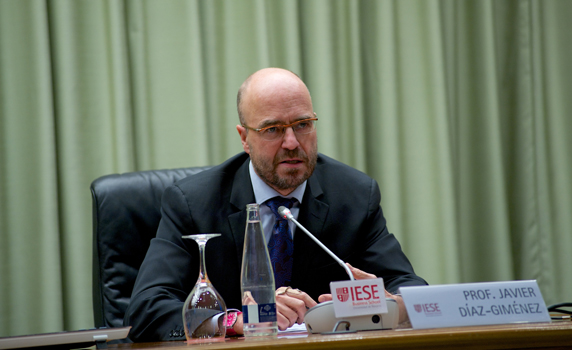
The Spanish pensions system suffers from a series of shortcomings that have rendered it obsolete. The reforms instituted by various governments since the 1980s have opted for minimum political cost but have maximized the problems of planning. Only “radical reform” that achieves a better distribution of costs can guarantee its long-term sustainability, according to Prof. Javier Díaz-Giménez.
In the Continuous Education session “Distribution and Capitalization in Spanish Pensions,” organized by the Alumni Association on October 3 on IESE’s Barcelona campus, the professor called for a transition to a “a system that would be indefinitely sustainable, that creates certainty and would be absolutely credible.”
The talk included the presentation of the study by the Fundación Edad&Vida “Distribution and Capitalization in Spanish Pensions,” carried out by an IESE research team led by professors Antonio Argandoña and Javier Díaz-Giménez and which was sponsored by Zürich. Prof. Díaz-Giménez listed some of the principles that should be borne in mind when designing an alternative pension system.
“It already exists and should be much like the Swedish system but adapted to the Spanish situation,” he said. In the first place, it should be universal, while the many regimes and exceptions in the Spanish system have made it “as far from being a universal system as one could imagine.” He emphasized the need to design a distribution system based on notional accounts, with defined contributions. It would also make sense to separate the solidarity and contributory parts making the contributory aspect a “mixed system: one part distribution and one part capitalized.” He added that all of this should be organized by the public sector through a pensions agency, which doesn’t now exist, making accounting more difficult.
Clara Armengol, a member of the Tax and Finance Commission of the Fundación Edad&Vida and director of pensions business at the Zürich Group in Spain reviewed the main principles set out in the study, which, apart from calling for radical reform, advises “encouraging and making the most of private savings.” She reminded her audience that “there is no simple and flexible product which gives small and medium businesses an incentive to make savings,” bearing in mind that they make up 90 percent of Spanish businesses.
Prof. Antonio Argandoña, Javier Valle, director general of Life and Pensions at the Zurich Group in Spain, and Higinio Raventós, president of the Fundación Edad&Vida, also took part in the session.